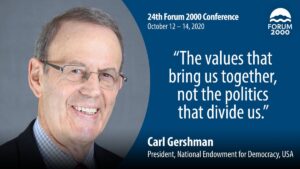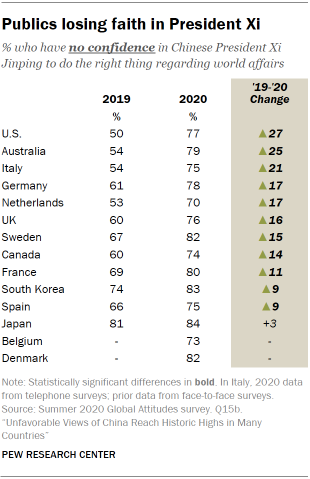Values are gaining increased prominence in foreign policy, driven not least by the China challenge (see above), says a new analysis from Chatham House, the London-based foreign policy think tank.
“Ensuring consistency in the next U.S. administration’s approach to democracy and human rights will be essential. Success on this dimension will depend, vitally, on upholding democratic norms and addressing social fractures at home,” argues analyst Leslie Vinjamuri. “The US will also need to work closely with its democratic partners to create and enable viable and sustainable policy innovations that help meet the economic and security needs of people and states across the Middle East, Latin America and Africa.”
Despite the incumbent’s aversion to leading with human rights, there has been growing pressure across the administration and in Congress to draw attention to, inter alia, China’s surveillance tactics, its repression of the Uighurs in Xinjiang and its restrictions of democratic freedoms in Hong Kong, Vinjamuri contends. The focus on values is likely to be maintained, but the next administration should develop a clear strategy for influencing behavior and avoid a focus on identity or ideology.
 Values matter because they provide moral cohesion at a time of partisan division, National Endowment for Democracy (NED) president Carl Gershman told the concluding panel of Forum 2000 this week.
Values matter because they provide moral cohesion at a time of partisan division, National Endowment for Democracy (NED) president Carl Gershman told the concluding panel of Forum 2000 this week.
Core democratic values have universal worth, argues J. Alexander Thier, Senior Democracy Fellow (Non-resident) at Freedom House. Equality, accountability, rule of law, media freedom and protection of human rights are critical to creating open economies and societies, he wrote in a recent report, A Force For Good in the World: Placing Democratic Values at the Heart of the UK’s International Strategy.
Putting democratic governance at the centre of its approach to foreign policy, development, and national security,” Thier added, in an analysis commissioned by the Westminster Foundation for Democracy. “This approach should be values-based, recognising the need to take a clear stand at key moments, but also provide practical support to strengthen democracy through strategic and evidence-based programmes using the UK’s world-class diplomatic, development and soft power tools.”
Thier is co-director, with Anne Witkowsky, a former Deputy Assistant Secretary of Defense for Stability and Humanitarian Affairs, of a new initiative which recognizes that the “profound geopolitical changes undermining and threatening democracy demand an urgent, strategic response.”
Stronger diplomatic, development, and security strategies are needed, as the efforts of successive administrations have proven insufficient to stem this democratic backslide, note Freedom House, the Center for Strategic and International Studies (CSIS), and the McCain Institute which launched a new bipartisan Task Force on US Strategy to Support Democracy and Counter Authoritarianism. The group’s leaders, experts, and former policy makers* will develop practical recommendations for a U.S. strategy that places the advance of democracy and the fight against authoritarianism at the heart of American foreign and national security policy.

Americans have short memories when it comes to soft power: Yet the history is messy, according to Hal Brands, the Henry Kissinger Distinguished Professor at Johns Hopkins University’s School of Advanced International Studies, and the co-author of “The Lessons of Tragedy: Statecraft and World Order.”
The Marshall Plan, which demonstrated U.S. generosity and initiative, was followed by McCarthyism, which led even close allies to conclude — as one secret Eisenhower-era report put it — that America “has no genuine attachment to some of the fundamental values of a democratic society,” he writes for Bloomberg:
 If America’s image is struggling these days, so is China’s. Beijing’s global favorability ratings have plummeted because of Covid-19, a pandemic that the U.S. may have botched, but that China unleashed. Distrust of Xi Jinping is at record levels, as well, reaching upward of 70% or even 80% in all but one of the countries polled.
If America’s image is struggling these days, so is China’s. Beijing’s global favorability ratings have plummeted because of Covid-19, a pandemic that the U.S. may have botched, but that China unleashed. Distrust of Xi Jinping is at record levels, as well, reaching upward of 70% or even 80% in all but one of the countries polled.
“Americans shouldn’t be indifferent to the soft-power plunge [which] shows how rapidly a democratic superpower can become the object of international resentment and even pity,” notes Brands. “Yet the genius of the American system has always been its capacity for self-correction.”
* Co-Directors
- J Alexander Thier, Senior Democracy Fellow (Non-resident) at Freedom House and Former USAID Assistant to the Administrator for Policy, Planning, and Learning
- Anne Witkowsky, Senior Democracy Fellow (Non-resident) at Freedom House and Former Deputy Assistant Secretary of Defense for Stability and Humanitarian Affairs
Members
- Nicole Bibbins Sedaca, Deputy Director and Professor, Master of Science in Foreign Service Program, Georgetown University and Kelly and David Pfeil Fellow at the George W. Bush Institute
- Sheila S. Coronel, Toni Stabile Professor and Director, Stabile Center for Investigative Journalism, Graduate School of Journalism, Columbia University
- Ambassador Eileen Donahoe
 , (right), Executive Director of the Global Digital Policy Incubator at Stanford University, FSI/Cyber Policy Center, and board member of the National Endowment for Democracy.
, (right), Executive Director of the Global Digital Policy Incubator at Stanford University, FSI/Cyber Policy Center, and board member of the National Endowment for Democracy. - Michael J. Green, Senior Vice President for Asia and Japan Chair, Center for Strategic and International Studies, Professor and Director of Asian Studies, Georgetown University School of Foreign Service
- Dr. E. Gyimah-Boadi, CEO, Afrobarometer
- David J. Kramer, Senior Fellow in the Václav Havel Program for Human Rights & Diplomacy and Director for European & Eurasian Studies at Florida International University’s Steven J. Green School of International and Public Affairs
- Tod Lindberg, Senior Fellow, Hudson Institute
- Stuart Levey, Former Under Secretary of Treasury for Terrorism and Financial Intelligence
- Rory MacFarquhar, Former Special Assistant to the President and Senior Director for Global Economics and Finance, National Security Council
- Ambassador Sarah E. Mendelson, Distinguished Service Professor of Public Policy, Head of Heinz College in Washington, DC, Carnegie Mellon University
- Ashley Quarcoo, Senior Fellow, Democracy, Conflict and Governance Program, Carnegie Endowment for International Peace
- The Honorable Randall G. Schriver, Chairman, Project 2049 Institute
- Ambassador Thomas A. Shannon, Jr., Senior International Policy Advisor at Arnold & Porter, and former Under Secretary of State
- Vera Zakem, Senior Technology and Policy Advisor at the Institute for Security and Technology and Founder of Zakem Global Strategies.







